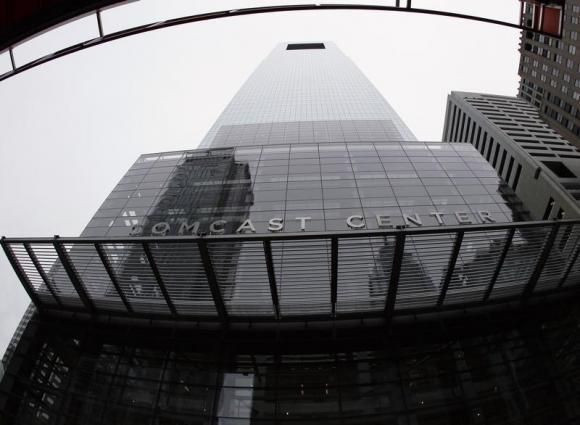Comcast-TWC Merger Crossroads: It's All About Broadband But Comcast Says No New Concessions Have Been Offered

Comcast Corp.’s proposed $45 billion takeover of Time Warner Cable Inc. may be going off the rails. The two cable companies are said to be meeting with the U.S. Justice Department on Wednesday to discuss “potential remedies” that would appease regulators who are reportedly concerned about the combined company’s control over the broadband market, according to sources cited by the Wall Street Journal.
People familiar with the process say the meeting could be a warning sign that the merger is in trouble.
“Anytime you go in to talk to the DOJ, it’s pretty one-sided,” said Lauren Wilson, a policy lawyer at Free Press, a Washington-based advocacy group. “They look at clues, don’t ask any questions and let you make your case.”
The Journal’s report came one day after a story by Bloomberg in which sources said staff attorneys at the DOJ are close to recommending that the merger be blocked. The reports have fueled speculation that Comcast and Time Warner Cable will approach the agency to discuss additional conditions that would allay anticompetitive concerns.
Free Press is one of the advocacy groups opposed to the merger and was also one of the most vocal opponents of AT&T’s 2011 takeover bid of T-Mobile, which ultimately failed. Wilson said the burden will be on Comcast to “present different conditions that would make the deal more palatable, and really present their case why those conditions will work in a way they’re supposed to.”
Still, it’s unclear what those conditions would be. The companies have already agreed to divest 3.9 million subscribers upon completion of the merger. One possible scenario is that they could be asked to divest even more.
Sena Fitzmaurice, a Comcast spokeswoman, said the company has not decided on any potential merger conditions and that reports to the contrary are “unequivocally false.” She declined to comment further on the specifics of the DOJ meeting.
“We continue to believe that our transaction with Time Warner Cable will bring substantial benefits to consumers without any competitive harms,” she added. “We will continue to engage in our productive discussions with the government and do not see any value in commenting on rumors and speculation.”
Even if further conditions are proposed, there is no guarantee that anything productive will come out of this week’s meeting. John Bergmayer, an attorney at Public Knowledge, a Washington-based public interest group, said companies under a merger review are generally allowed to meet with federal agencies and discuss any topics they want, but in the end a meeting is just a meeting. “So a story that says ‘Comcast to meet with agency to discuss X’ doesn’t necessarily indicate receptivity by the agencies to X,” he said.
Optimism Souring?
Up until last week at least, Wall Street remained confident that the Comcast-TWC merger would not run afoul of antitrust concerns. A recent survey of 50 cable and telecom investors by Macquarie Equities showed 83 percent believed the merger would take place -- up from 80 percent in January -- with most expecting it to be approved by the end of the summer. This despite throngs of activists, consumer groups and labor unions that have been calling on regulators to block the deal, saying it would reduce competition and raise cable bills.
“Consumers tend to be a lot more vocal against these mergers, whereas I think Wall Street tends to be a little more focused on how the FCC and the DOJ sees the two of them combining,” said Amy Yong, an analyst with Macquarie.
A post-merger Comcast would have 30 million broadband subscribers, a third of the nation’s pay TV market and its own media division in NBCUniversal. While the deal was once seen as a certainty, both the DOJ and the Federal Communications Commission are now said to be looking more closely at the merger’s potential effect on competition and the public interest, respectively.
“We know that the FCC and DOJ are working in concert, and they rarely go in different directions,” said Wilson. “From everything I’ve heard, in this instance, they’ve been working really well together.”
Many opponents of the merger insist that no amount of conditions will allay their fears that Comcast-TWC would become too powerful a gatekeeper of content. “We’ve told the FCC and regulators here in California that we don’t think there are remedies that can limit the harms to competition,” said Ellen Stutzman, director of public policy and research for the Writers Guild of America, West. “It’s welcome news to us that regulators continue to really scrutinize it.”
There is another option: Comcast could simply walk away. The deal has no breakup fee, which is unusual for a large merger, but not unheard of. In such a scenario, Yong said, Comcast could pursue other acquisitions in wireless or media, including possibly T-Mobile or Discovery.
Based on the Macquarie survey, Yong said investors are split on whether a clean break would be a good or bad thing for the pay TV industry as a whole. “If Comcast walks away, half the people think that it’s not necessarily a bad sign for the industry,” she said. “The other half thinks otherwise.”
Christopher Zara is a senior writer who covers media and culture. News tips? Email me here. Follow me on Twitter @christopherzara.
© Copyright IBTimes 2025. All rights reserved.






















